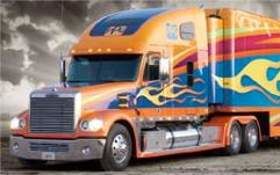Practical Application Of Air Brakes Knowledge
Topic 32527 | Page 1

Because you were unhooked from the trailer and could risk releasing the trailer brakes with someone inside the trailer?
Great pop quiz, Chief. I like how it requires the reader to think of why and how a system functions the way it does.
Yep. Charging the trailer with air releases the spring brakes so the only thing holding the trailer in place would be the landing gear.
I liked it too. Some rookies are surprised when the receiver makes them disconnect from the trailer and then asks for the keys to the truck. (Some of them actually do this) As Chief points out, there is a valid reason why some of them take extra steps for their safety.

Had it happen at our warehouse in Delaware. Driver was being loaded, had engine running for the a/c, no chock at wheels, trailer moved and fork lift drove off the dock injuring the operator but not seriously. I had no problem taking off the red airline, chocking wheels, turning over the keys and being safe rather than sorry.
At one of my customers, I gladly gave him my keys and unhooked the red. We were chatting and he told about the difficulty he had with some drivers not complying.
He really appreciated it, had me unloaded in very quick time. He said if the driver is a jerk about it, the unloading time increases exponentially lol.

After an incident years ago with the shipper losing my keys, I no longer hand them over. I just unhook and pull forward. If they still pitch a fit I just hand them a dummy key. I have a friend who owns a mobile locksmith and he gives old messed up blanks.
Shipper:
The customer who is shipping the freight. This is where the driver will pick up a load and then deliver it to the receiver or consignee.
After an incident years ago with the shipper losing my keys, I no longer hand them over.
I do the same. I'll hand over a random key from a vehicle I no longer drive.
Shipper:
The customer who is shipping the freight. This is where the driver will pick up a load and then deliver it to the receiver or consignee.
New Reply:
New! Check out our help videos for a better understanding of our forum features

















Preview:








 TT On Facebook
TT On Facebook
I picked up a trailer yesterday that had an issue with the retaining bracket on the red glad-hand (the emergency air supply). As is often the case, it had gotten bent out thereby creating a loose connection with the airline coming from the tractor. I had bent it in some, but it continued to leak.
When I got to the shipper this morning, they required me to unhook from the trailer for loading. After I unhooked, I pulled out my tools to bend the bracket closer to the glad-hand to make the connection tighter. I wanted to check it for leaks and grabbed the red air line to connect it to the trailer, but after thinking for a minute, I changed my mind.
Question for those studying air brakes for their CDL test or those who just took the CDL test:
Why did I determine it was not a good idea to connect the red glad-hand to the trailer and "charge" the trailer with air?
CDL:
Commercial Driver's License (CDL)
A CDL is required to drive any of the following vehicles:
Shipper:
The customer who is shipping the freight. This is where the driver will pick up a load and then deliver it to the receiver or consignee.
HOS:
Hours Of Service
HOS refers to the logbook hours of service regulations.OOS:
When a violation by either a driver or company is confirmed, an out-of-service order removes either the driver or the vehicle from the roadway until the violation is corrected.